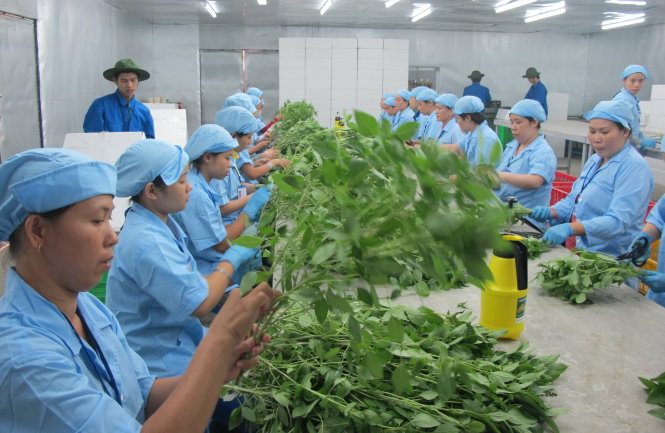All Vietnamese fruit and vegetable exporters now risk being banned from selling their products to the European Union (EU) after a few businesses have been discovered breaching food safety rules set by the bloc.
The European Commission Directorate General for Health and Consumers (DGSANCO) has issued a warning to Vietnam’s green produce exporters after three shipments were found containing harmful bacteria, the European Market Agency, under the Vietnamese Ministry of Industry and Trade, announced Tuesday.
DGSANCO has received reports from European countries on three batches of Vietnamese basil and bitter melon that were contaminated with bacteria harmful to consumer health since February, the agency said.
The Directorate General had previously ruled that within the year from February 1, 2014 to February 1, 2015, if five breaches of food safety regulations are detected, the EU will enact a ban on imports of green produce from Vietnam.
Produce exporters in the Southeast Asian country are thus only two cases away from crossing the line, prompting the European Commission health watchdog to release the warning.
“If the ban is actually enacted, no Vietnamese-grown produce will be allowed to enter the EU,” the European Market Agency said.
“Furthermore, it will also affect the reputation of Vietnamese goods on the global market.”
The agency has therefore ordered that local businesses strictly follow EU food safety regulations to avoid further violations.
Upon receiving the DGSANCO warning, the Plant Protection Department, under the Ministry of Agriculture and Rural Development, has decided to stop approving new exports of five types of vegetables to the EU, according to a source close to Tuoi Tre (Youth) newspaper.
The agro-products include basil, chili, bitter melon, celery, and cilantro, with the suspension lasting until the end of next year.
The move is seen as “necessary” by Dang Van Hoang, head of the Zone 2 Plant Quarantine Sub-Department of the Plant Protection Department.
“All Vietnamese fruit and vegetable products will be blacklisted by DGSANCO if two more violations are detected,” Hoang said.
Vietnam will also lose the EU market to rivals such as Thailand if it is prohibited from accessing the region, Hoang added.
“Only a few businesses are now hurting the whole exporting sector,” he said.
One bad apple spoils the whole bunch
Some fruit and vegetable exporters complained that only the businesses that breach the rules should pay the price, rather than everyone involved in the sector.
“Our products have never failed to pass quality and safety tests by the EU side, but whenever the EU releases a warning, we have to cease exports,” a business owner said. “Our business is affected even though we are not the violators.”
The director of another vegetable exporting firm said he now has to contact partners in Asia and America to find outlets for the surplus supply of basil, cilantro, and bitter melon, which cannot reach their EU customers following the suspension by the plant protection department.
“We used to ship our products to the EU by air on a monthly basis, and now our business plans are shattered because of mistakes by others,” he lamented.
Hoang, from the plant quarantine sub-department, said relevant Vietnamese agencies are negotiating with the EU to expand the cap on the number of permissible food safety violations by Vietnamese exporters.
“With Vietnam shipping as many as 15,000 batches of produce to the EU annually, the five-case limit represents a 0.03 percent ratio, which is too rigorous,” Hoang said.
Like us on Facebook or follow us on Twitter to get the latest news about Vietnam!




















































